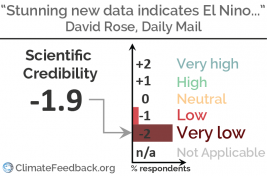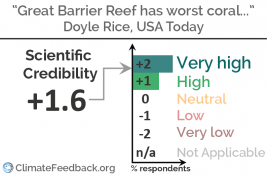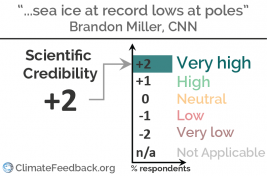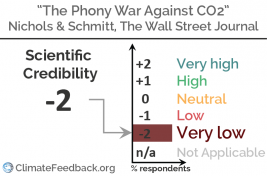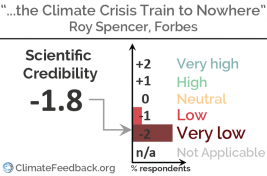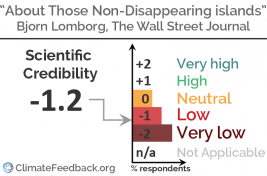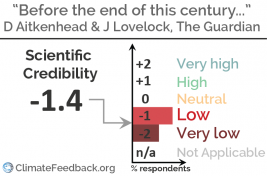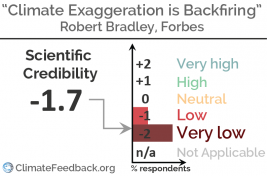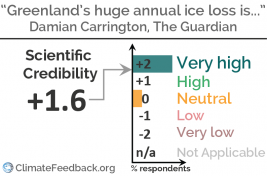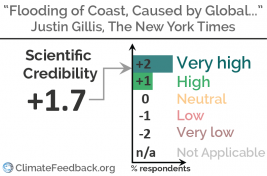Article Reviews
“Is this article consistent with the latest thinking and knowledge in science?”
“Would experts in this field endorse the main message of this article?”
These are the types of questions our “feedbacks” are designed to answer. If the feedback is positive, you can generally assume the information you’re reading is of high credibility. If it’s negative, however, you may want to read with extra care and attention — some of the information contained and conclusions reached are not consistent with science.[1]
Analysis of “Stunning new data indicates El Nino drove record highs in global temperatures…”
in Daily Mail, by David Rose
This is an incredibly misleading article. It cherry picks a dataset taking measurements 2 miles up in the atmosphere only over land areas that disagrees with the other two datasets that examine the same values... The author is taking a normal modest cooling at the end of a large El Niño event and spinning it completely out of proportion.
— 02 Dec 2016
Analysis of “Australia’s Great Barrier Reef has worst coral die-off ever”
in USA Today, by Doyle Rice
"This article is mostly accurate ... the frequency of massive bleaching events is increasing, will continue to increase in the near future, and these events do not need to occur annually to kill the reef. The variability of El Niño Southern Oscillation on top of the background warming trend of surface temperatures means that we will exceed the bleaching thresholds more frequently."
— 30 Nov 2016
Analysis of “Amid higher global temperatures, sea ice at record lows at poles”
in CNN, by Brandon Miller
"Well outlined and balanced article, describing the evident link between low sea ice and climate warming and the melt-albedo feedback, but also mentioning the role of weather and short-time variability."
— 24 Nov 2016
Analysis of “The Phony War Against CO2”
in The Wall Street Journal, by Rodney Nichols and Harrison Schmitt
"The article speaks about scientific questions under an "opinion" banner—as if questions about the role of CO2 in the Earth system could be a matter of opinions. For the major final conclusion "With more CO2 in the atmosphere, the challenge [to feed additional 2.5 billion people] can and will be met.", there is absolutely no scientific credibility, nor support in the scientific literature—it is pure fantasy."
— 03 Nov 2016
Analysis of “Hillary Clinton Boards The Climate Crisis Train To Nowhere”
in Forbes, by Roy Spencer
"The article is inaccurate in several places and conveys that one must choose between solving immediate problems, such as poverty, and long-term risks such as climate change. We can do both, and indeed must do both if we take poverty seriously, since climate change disproportionately affects the poor."
— 29 Oct 2016
Analysis of “About Those Non-Disappearing Pacific Islands”
in The Wall Street Journal, by Bjorn Lomborg
"This article is very interesting because it exemplifies a highly-misleading rhetorical practice that is effective, frequently used, but not easily recognized by the public: "paltering"... A successful palterer will try to avoid being untruthful in each of his/her utterances, but will nonetheless put together a highly misleading picture based on selective reporting, half-truths, and errors of omission..."
— 17 Oct 2016
Analysis of “James Lovelock: ‘Before the end of this century, robots will have taken over’”
in The Guardian, by Decca Aitkenhead & James Lovelock
"Extraordinary claims demand extraordinary evidence, and Lovelock has not even come up to the standards of providing what the scientific community would consider to be ordinary evidence. The journalist did not balance Lovelock’s statements with a set of clear statements saying that the vast majority of informed climate scientists (as, for example, represented by the IPCC reports) have reached consensus on conclusions that are diametrically opposed to what Lovelock is saying, and that the IPCC scientists have backed up their statements with a wealth of empirical data, whereas Lovelock is largely opining without providing any substantive evidence to support his rather extraordinary claims."
— 07 Oct 2016
Analysis of “Climate Exaggeration is Backfiring”
in Forbes, by Robert Bradley Jr.
"This picking of quotes that are convenient for Robert Bradley Jr.'s narrative while ignoring what most climate scientists say is one of the most used rhetorical tools of this piece. The other is the use of offensive emotional language to reduce the critical thinking of his readers. People should know that Forbes is nowadays just a blogging platform."
— 29 Sep 2016
Analysis of “Greenland’s huge annual ice loss is even worse than thought”
in The Guardian, by Damian Carrington
"I find the headline accurate and supported by the article. The article explains the novelty and impact of the research accurately for the general readership and in particular the context provided from the scientists works really well in this regard."
— 26 Sep 2016
Analysis of “Flooding of Coast, Caused by Global Warming, Has Already Begun”
in The New York Times, by Justin Gillis
"The theory of sea-level rise and flood problems is pretty well understood — this makes the point that this theory is also happening now and can only be expected to get worse — sea levels have been rising on the US east coast for the last 150 years or more and even if current trends simply continue, impacts will continue to grow. As the article states, we actually expect a significant acceleration of sea-level rise in the coming decades meaning the impacts will grow more rapidly."
— 07 Sep 2016
[1] Note: These feedbacks do not constitute endorsements of the author’s political or economic ideology, rather they are assessments of the scientific foundations and reasoning of the argumentation contained within each article.

